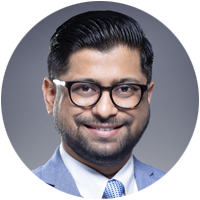Ramkrishna Kumar Singh, MD, MPH | Global Clinical Scholars Research Training

Ramkrishna Kumar Singh is a physician and researcher with clinical focus areas in many impactful topics, such as hepatic steatosis, Alzheimer’s disease and dementia, and breast cancer. He earned a Master of Public Health (MPH) degree from Washington University and is a Graduate Policy Scholar from the Clark-Fox Policy Institute. Most recently, Singh worked as a research assistant at Washington University’s Global Research on Inclusion and Disability (GRID) lab, where he focused on dementia and Alzheimer’s patients in Afghanistan, Pakistan, and St. Louis, specifically looking at the social determinants of health, aging, and cognitive functioning. He graduated from Harvard Medical School’s Global Clinical Scholars Research Training program in May 2024 and started as a post-doctoral neurology research associate just weeks after graduation.
After earning his MPH degree, Singh found that his work and use of statistical analysis techniques were solely focused on public health topics. As a physician with a desire to expand the scope of his medical research and career options, Singh applied for and was accepted to the Global Clinical Scholars Research Training program at Harvard Medical School.
“I wanted to have focused experience and training in clinical research. The quality of research and its impact on the community matter—Harvard is known for its stellar research, and I wanted mentorship and training from experts in their fields.”
Developing a Multifaceted Clinical Research Skillset
As an early career researcher, Singh asked himself about the necessity of learning coding languages and skills. He quickly realized that even if a researcher is not actively coding in their day-to-day work, there is a crucial need to understand what is happening behind the scenes as a well-rounded researcher. The Global Clinical Research Scholars Training program teaches students to use STATA, a statistical software for analysis and visualization of clinical data. “With a coding skillset, you can guide the statistician on tests that need to be done. If there is a time crunch, you can do the analysis on your own. You are basically a one-person army, so you can really control the quality of your research.”
Singh also reflects on the value that his group project team members added to his experience. This Harvard Medical School program enrolls physicians and clinicians from around the world with varying focus areas, creating a diverse network of perspectives. “Many of my team members were advanced in their careers and offered perspectives on our group projects that I had not previously considered. It’s been great to build these connections and relationships.” Singh expects the relationships he developed throughout the program will play a lasting role in his career.
The Global Clinical Scholars Research Training program comprises three in-person workshops over one year. In addition to the development of research and analysis skills, as well as networking opportunities, Singh highly valued the interpersonal growth he experienced. The workshops featured industry-focused panel discussions from experts, soft skills training, and insights gleaned from the personal experiences of accomplished researchers.
“There was research experience as well as personal development, and I did not find that with any other programs,” says Singh.
A Capstone Project with Real-World Impact
During the program, students develop a capstone project in which they create and submit a research proposal to receive Harvard Medical School faculty review. For many researchers in the program, this part of the curriculum offers an excellent opportunity to elevate their work from other aspects of their career. Having been heavily involved in clinical research related to hepatic steatosis in liver transplant patients and prospective liver transplant donors at a leading hospital in New Delhi, Singh decided to expand upon this topic during his time at Harvard Medical School.
To study hepatic steatosis, typically an MRI is needed, which comes with expensive imaging costs and is not realistic or accessible for those who live in low-socioeconomic areas. Singh wanted to develop a way to monitor and elevate care for patients in need without access to an MRI.
“A large population in India lives below the poverty line. I was hoping to create a model where if I added details such as liver volume or psoas muscle index to do an initial screening, patients could receive an ultrasound.” Singh’s ultrasound model would offer a more accessible way to screen for hepatic steatosis and determine if a patient needs to see a hepatologist or specialized physician for further care. In the months and years to come, the input from Harvard Medical School faculty and peers will continue to impact this project.
Career Advancement after Global Clinical Scholars Research Training
In June of 2024, Singh will begin a new role as a post-doctoral research associate at Washington University in the neurology department, a highly competitive position, to continue his work in clinical research on Alzheimer’s disease. He credits his experience at Harvard Medical School for this next step in his career. “Wherever I applied, the first thing the interviewers wanted to know about was my experience in the Global Clinical Scholars Research Training program. Many times, there was a focused discussion just on the program group projects, workshops, and my clinical training at Harvard.” Within two weeks of graduation, Singh had his job offer in hand.
Singh is immensely grateful to have received multiple job offers and the opportunity to choose the research area he was most interested in pursuing, thanks to his time spent in the Global Clinical Scholars Research Training program.
Written by: Meredith Faxon